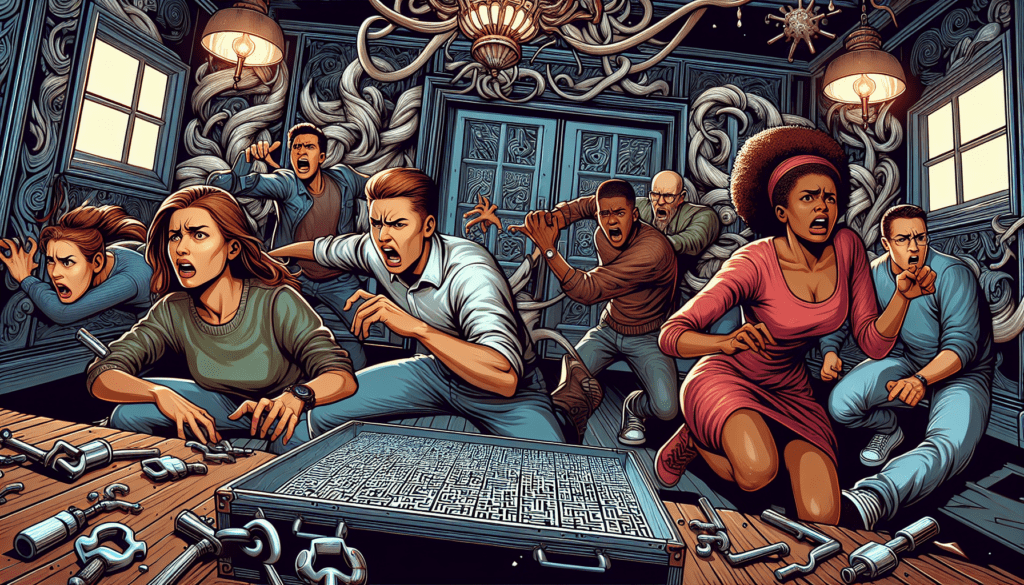Have you ever found yourself trapped in a room, with just an hour to decipher clues, solve puzzles, and unlock the door to freedom? If so, then you have experienced the adrenaline-pumping, heart-racing adventure known as an escape room. These interactive games have taken the world by storm, captivating adventurers who can’t resist the thrill of the challenge. But have you ever wondered why escape rooms can evoke such intense feelings of stress? In this article, we will explore the psychological factors that make these experiences both exhilarating and nerve-wracking. So buckle up and get ready for a thrilling ride into the world of escape rooms.

The Concept of Escape Rooms
Escape rooms have become increasingly popular in recent years as a thrilling and immersive form of entertainment. These interactive games offer a unique and exciting experience that engages both the mind and the senses. If you’re looking for a fun and challenging adventure, escape rooms are the perfect choice.
What are escape rooms?
Escape rooms are physical adventure games in which a group of participants, typically ranging from two to eight people, are locked inside a themed room. The goal is to solve a series of puzzles and challenges within a set time limit, usually around 60 minutes, in order to escape the room. Each room has its own unique story and set of clues, creating a rich and immersive experience for the players.
How do escape rooms work?
Escape rooms are designed to test your problem-solving skills, creativity, and teamwork. As soon as you step into the room, you are thrust into a different world with a specific theme, such as a haunted house or a detective’s office. Your mission is to explore the room, search for hidden clues, and solve puzzles that will lead you to your ultimate objective – escaping the room.
The Element of Time Pressure
One of the key aspects that make escape rooms so exhilarating is the element of time pressure. The clock is ticking, and you only have a limited amount of time to solve all the puzzles and escape the room. This creates a sense of urgency and adds an adrenaline rush to the experience.
Limited time constraints
Escape rooms typically have a time limit of around 60 minutes. This time constraint adds a layer of difficulty and heightens the overall intensity. You need to stay focused and work efficiently to make the most of the limited time available.
Sense of urgency
The countdown timer displayed in the room constantly reminds you of the ticking clock. The pressure to beat the clock can evoke a rush of emotions, including excitement, anxiety, and a surge of adrenaline. This sense of urgency intensifies as time ticks away, creating a thrilling and immersive experience.
Complex Puzzles and Challenges
Escape rooms offer a wide range of puzzles and challenges that test your mental agility and problem-solving abilities. From deciphering codes and solving riddles to unlocking hidden compartments, each puzzle requires a unique approach and demands your full attention.
Wide range of puzzles
Escape rooms incorporate various types of puzzles, such as math problems, word games, logic puzzles, and spatial challenges. This diversity ensures that there is something to challenge everyone, regardless of their strengths or weaknesses. Engaging with a variety of puzzles adds depth to the game and keeps you on your toes.
Difficulty levels
Escape rooms are designed to cater to different skill levels, offering puzzles that range from beginner to advanced. Whether you’re a puzzle enthusiast or new to the genre, there is an escape room that suits your level of expertise. The varying difficulty levels ensure that you are always challenged and engaged throughout the experience.
Need for critical thinking
To successfully navigate through an escape room, critical thinking is essential. You need to analyze clues, make connections, and think outside the box to solve complex puzzles. The ability to think critically under pressure is crucial for making progress and escaping the room within the allotted time frame.
The Fear of Failure
Escape rooms are not just about having fun; they also come with a fear of failure. The high stakes and the fear of not being able to solve all the puzzles and escape the room can create a sense of anxiety and pressure.
High stakes
Being locked in an escape room with a limited amount of time adds an element of pressure and high stakes. The fear of failure and the desire to succeed create a captivating and intense atmosphere within the room. The thought of not escaping before time runs out can be both exhilarating and nerve-wracking.
Public performance anxiety
Escape rooms often attract groups of friends, colleagues, or family members who come together to solve the challenges. The fear of letting others down or being judged for not contributing to the team’s success can induce performance anxiety. This added pressure can make the experience even more challenging, but it also promotes team bonding and encourages effective communication.

Immersive Environments and Suspense
Escape rooms immerse you in a different world, complete with dark and unfamiliar settings. The combination of immersive environments and suspenseful elements enhances the overall experience and keeps you on edge.
Dark, unfamiliar settings
Escape rooms are designed to transport you to a different reality. The dimly lit rooms with mysterious props and decor create an atmosphere of suspense and intrigue. The unfamiliarity of the surroundings adds to the sense of adventure and heightens your senses.
Tension and suspense effects
Escape rooms often incorporate elements of suspense and tension to enhance the overall experience. From eerie sounds to unexpected surprises, these effects keep you on your toes and make every moment inside the room feel suspenseful. The fear of the unknown and the anticipation of what awaits you around the corner create an immersive and thrilling experience.
Group Dynamics and Communication Challenges
While escape rooms can be enjoyed individually, they are typically designed for small groups. Solving puzzles and escaping the room require effective collaboration, teamwork, and communication among the participants. However, these group dynamics and communication challenges can also add to the level of stress in the room.
Collaboration and teamwork
Escape rooms emphasize the importance of collaboration and teamwork. Each member of the group brings their unique skills and perspectives to the table, and working together is crucial to solving the puzzles and accomplishing the objective. Cooperation, delegation, and effective utilization of everyone’s strengths are key to success in the room.
Effective communication
Clear and efficient communication is essential in an escape room. Sharing information, coordinating efforts, and exchanging ideas allow the team to progress and solve puzzles more effectively. However, communication challenges may arise due to the time pressure and the high-stress environment. Overcoming these obstacles requires effective listening and effective articulation.
Conflict resolution
In the tense and time-sensitive environment of an escape room, conflicts and disagreements may arise. Differences in opinions, divergent problem-solving approaches, and the stress of the situation can lead to friction within the group. Navigating these conflicts and finding effective resolutions is crucial to maintaining a harmonious atmosphere and maximizing the chances of success.

Physical and Mental Exhaustion
Escape rooms can be physically and mentally demanding, pushing participants to their limits. The combination of intense mental exercises and physical activity can result in exhaustion.
Physical demands
Escape rooms often require participants to be physically active. Crawling, climbing, and searching for hidden compartments can be physically strenuous, especially for participants who are not accustomed to physical activities. The physical demands of the room add an extra layer of challenge and contribute to the overall fatigue experienced during the game.
Mental fatigue
The mental exertion required to solve complex puzzles and challenges can quickly lead to mental fatigue. As the room progresses and the clock continues to tick, the pressure to think quickly and critically can be mentally draining. The ability to maintain focus and mental stamina throughout the game becomes increasingly challenging as exhaustion sets in.
Fear of the Unknown
Uncertainty is a prevalent factor in escape rooms, and the fear of the unknown can add another layer of stress to the experience. The unpredictable nature of the puzzles and the potential for unexpected surprises can induce anxiety and heighten the overall excitement.
Uncertainty of outcomes
In an escape room, you can never be entirely sure of what lies ahead. The puzzles may have multiple solutions, and the outcome depends on your ability to decipher the clues and make progress. The fear of not knowing whether you are on the right track and the uncertainty of whether you will be able to escape can create a heightened sense of anticipation and stress.
Fear of the unexpected
Escape rooms are known for incorporating unexpected surprises and twists into their gameplay. From secret passages to hidden compartments, you never know what surprises await you at every turn. The fear of the unexpected adds an element of unpredictability and keeps you alert and engaged throughout the experience.

Pressure to Succeed and Impress
Escape rooms often tap into our competitive nature and desire to show competence. While the primary goal is to have fun, there is also a drive to succeed and impress others.
Competitive nature
Escape rooms may be seen as a friendly competition between teams. The desire to outperform other groups and be the fastest to escape can intensify the pressure and increase stress levels. The competitive nature of the game can push participants to their limits and bring out their best problem-solving skills.
Desire to show competence
Escape rooms provide an opportunity to showcase your problem-solving abilities and demonstrate your competence to your teammates. The fear of not contributing effectively or letting your team down can fuel the desire to perform well and impress others. This desire to prove oneself can create additional pressure and stress inside the room but can also lead to a rewarding sense of accomplishment.
Escape Room Design and Gameplay
Escape rooms are meticulously designed to provide a thrilling and challenging experience. From intentional stress-inducing elements to a thrill-seeking appeal, these aspects contribute to the overall success and popularity of escape rooms.
Intentional stress-inducing elements
Escape rooms are intentionally designed to create stress and push participants to their limits. Time constraints, challenging puzzles, and the fear of failure are carefully incorporated to elicit a sense of urgency and excitement. The intentional stress-inducing elements engage participants on a deeper level and make the experience more memorable.
Thrill-seeking appeal
Escape rooms tap into our innate sense of adventure and thrill-seeking. The combination of an immersive environment, time pressure, and complex puzzles provides a unique and exhilarating experience. The opportunity to challenge ourselves and overcome obstacles in a safe and controlled environment is what makes escape rooms so popular and enticing.
In conclusion, escape rooms offer a thrilling and immersive experience that can push players to their limits. The concept of escape rooms, with their time pressure, complex puzzles, fear of failure, immersive environments, group dynamics, physical and mental challenges, fear of the unknown, pressure to succeed, and intentional design elements, all play a role in creating a stressful yet exciting adventure. Despite the stress, escape rooms offer a fun and unique opportunity to engage with friends, family, or colleagues, promoting collaboration, critical thinking, and communication skills. So, if you’re up for an adrenaline-pumping and mind-bending challenge, step into an escape room and embark on an unforgettable adventure.

